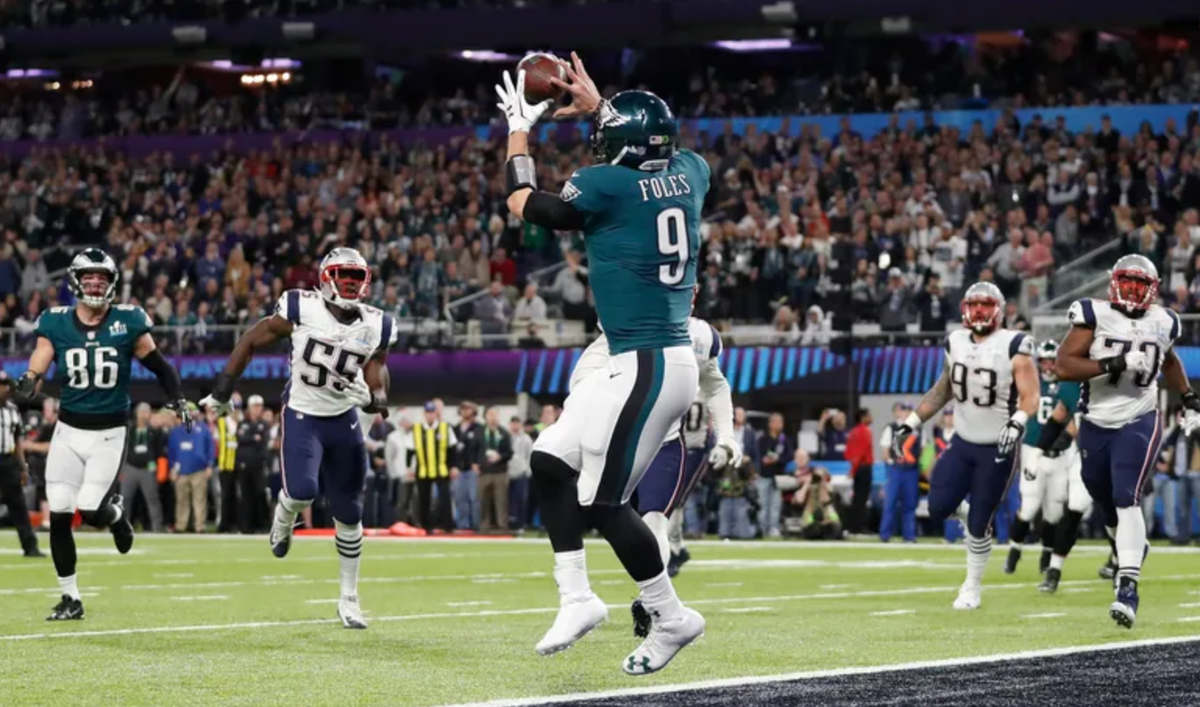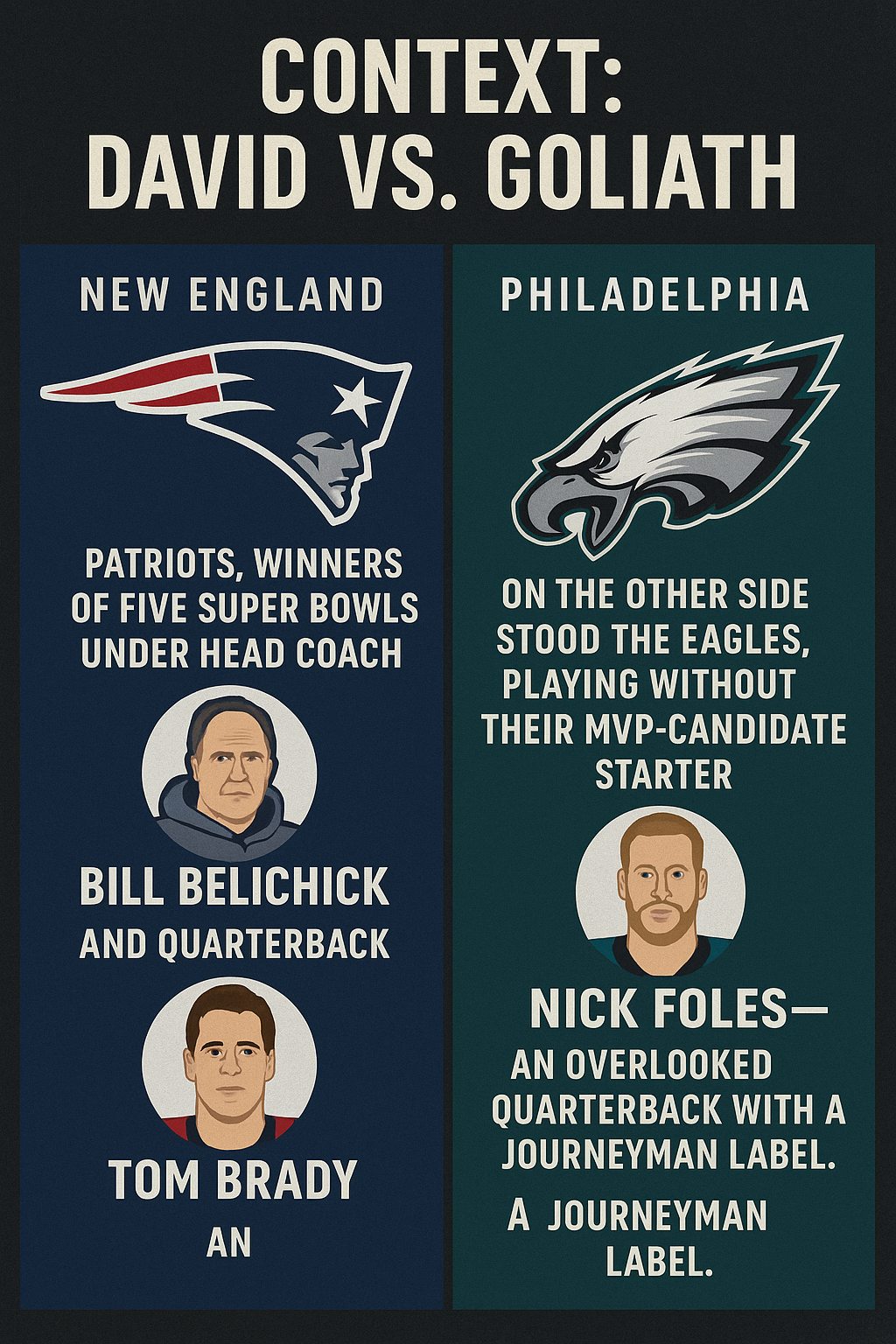Super Bowl LII: When the Underdogs Howled

Super Bowl LII, played on February 4, 2018, at U.S. Bank Stadium in Minneapolis, was not just a game—it was a legend in the making. The Philadelphia Eagles, led by backup quarterback Nick Foles, shocked the world by defeating Tom Brady and the dynastic New England Patriots in a 41–33 shootout.
It was Philadelphia’s first Super Bowl title, and the fashion in which it was earned remains one of the most exhilarating and iconic moments in NFL history.
Context: David vs. Goliath
Coming into the game, the narrative was simple: the Patriots, winners of five Super Bowls under head coach Bill Belichick and quarterback Tom Brady, were the juggernauts. On the other side stood the Eagles, playing without their MVP-candidate starter Carson Wentz, relying on a backup in Nick Foles—an overlooked quarterback with a journeyman label.
“Very few outside of Philadelphia gave the Eagles a chance,” said John Mathers, senior analyst at the Super Bowl Historical Society. “But they played fearless football, and Nick Foles delivered the performance of a lifetime. This was a storybook ending with an underdog twist.”

Offensive Explosion
What unfolded over four quarters was a breathtaking offensive display from both teams. The Eagles struck first with a field goal, but the real fireworks began shortly after. LeGarrette Blount powered in a 21-yard touchdown run against his former team, and Alshon Jeffery made a stunning 34-yard catch for a score. The Patriots responded with methodical drives orchestrated by Brady, who threw for a Super Bowl-record 505 yards and three touchdowns.
The turning point, however, came late in the second quarter with what is now known as the “Philly Special.” On fourth-and-goal from the 1-yard line, Foles lined up in shotgun, motioned out wide, and caught a touchdown pass from tight end Trey Burton.
“It was one of the gutsiest play calls in Super Bowl history,” said Dana Grover, researcher with the Super Bowl Historical Society. “To dial that up with a backup quarterback on the biggest stage—it changed the tone of the game and cemented Doug Pederson’s legacy as a bold, fearless coach.”
The “Philly Special”: Bravery Redefined
The Philly Special wasn’t just a trick play. It was a declaration. A message that Philadelphia wasn’t there just to compete—they were there to win. The moment became instantly iconic and was replayed endlessly in the weeks and years that followed.
Foles, for his part, played calm, calculated football. He finished 28-of-43 for 373 yards, three passing touchdowns, and one unforgettable receiving touchdown. For his heroics, he was named Super Bowl MVP.
Patriots’ Relentless Comeback Attempt
Despite trailing by 10 in the third quarter, the Patriots were far from finished. Brady kept the offense rolling, connecting with Rob Gronkowski and Danny Amendola to cut into the lead. A touchdown pass to Gronk early in the fourth gave New England its first lead of the game, 33–32.
But the Eagles responded with a clock-eating drive, culminating in a 11-yard touchdown strike from Foles to Zach Ertz. The drive consumed over seven minutes and demonstrated Foles’ mastery of Pederson’s aggressive offensive scheme. A failed two-point conversion left the score at 38–33, and Brady would have one more chance to answer.
The Strip Sack Heard Around the World
With just over two minutes remaining, Tom Brady dropped back to pass on a critical second down. Eagles defensive end Brandon Graham fought through the line and stripped the ball from Brady—Derek Barnett recovered the fumble, and U.S. Bank Stadium erupted. The Eagles tacked on a field goal, extending their lead to 41–33, and a final Hail Mary attempt by Brady fell incomplete.
The Eagles had done it. For the first time in franchise history, they were Super Bowl champions.
Records and Legacy
Super Bowl LII was an offensive masterclass. The two teams combined for 1,151 yards, the most in any game in NFL history—regular season or postseason. There were no punts, and the only turnover of the game—a forced fumble by the Eagles defense—was arguably the most pivotal play.
The Patriots had 613 yards and still lost, an unprecedented stat line. Brady set the record for most passing yards in a Super Bowl but walked away without a ring.
Nick Foles became the first quarterback in NFL history to throw and catch a touchdown in the same Super Bowl. His story, from nearly quitting football to winning the biggest game of them all, was almost too cinematic to be real.
The Human Side
What made this game resonate so deeply wasn’t just the stats. It was the emotional release—the unburdening of a fan base that had waited over half a century for this moment. Images of grown men weeping, of entire families hugging in living rooms and bars across Philadelphia, were broadcast across the world.
“Super Bowl LII reminded us why we love this game,” said John Mathers. “It was proof that heart, grit, and belief still matter in an era of metrics and dynasties.”
Coaches and Contributors
Doug Pederson’s aggressive play calling throughout the postseason and especially in this game helped define a new coaching archetype: one unafraid to trust analytics, embrace calculated risks, and play to win, not just avoid losing.
On the defensive side, the Eagles' coaching staff, led by defensive coordinator Jim Schwartz, struggled at times to contain Brady, but delivered the key stop when it mattered most.
Patriots Perspective
It’s rare that a quarterback throws for over 500 yards and loses, but such is the cruelty of football. Brady was brilliant, but a porous New England defense couldn’t stop the Eagles’ offense when it mattered. The decision not to play cornerback Malcolm Butler—a starter for most of the season—remains one of the most debated coaching moves in Super Bowl history.
Belichick refused to elaborate, fueling speculation and fan frustration in New England.
Legacy and Aftermath
Super Bowl LII changed the trajectory of the Eagles’ franchise. Though the team would regress in the following seasons and eventually move on from Foles and Pederson, this victory is immortalized in Philadelphia lore. Statues, murals, and street signs still commemorate the “Philly Special.”
For the Patriots, it was a momentary setback. They would return to the Super Bowl the following year and defeat the Los Angeles Rams in Super Bowl LIII. But for one night in Minneapolis, the dynasty met its match in the form of a gritty, fearless team that believed in itself when few others did.
Conclusion
Super Bowl LII stands as a reminder that football is not scripted. It is unpredictable, thrilling, and glorious in its chaos.
The Philadelphia Eagles, behind an unlikely hero, took down a dynasty, rewrote the narrative, and delivered one of the greatest performances the game has ever seen.
